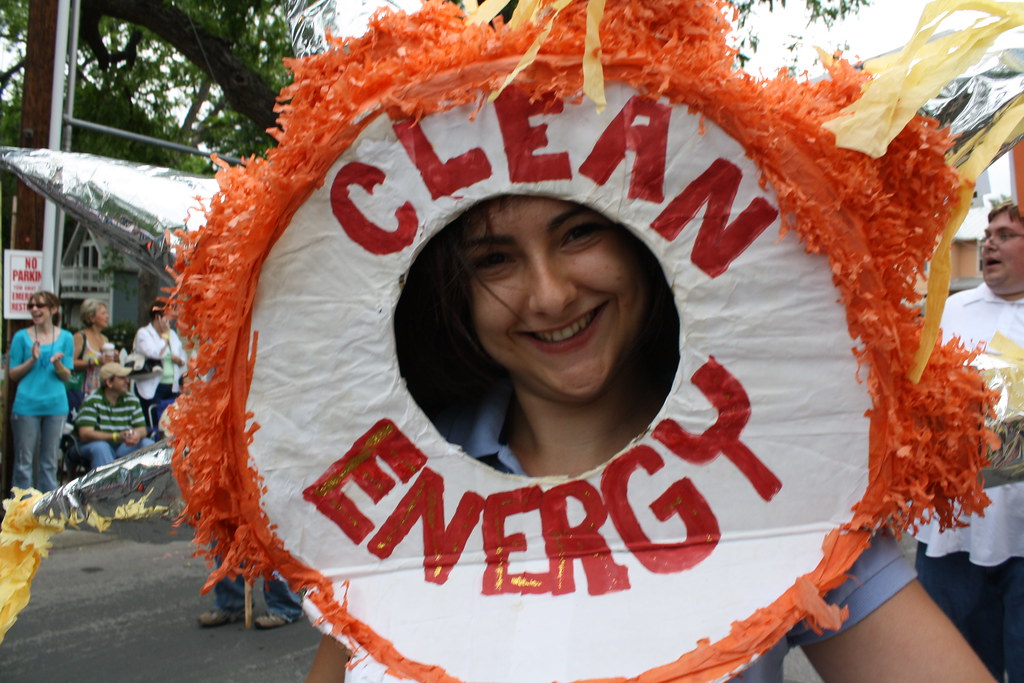
Greg Harman
Queen Ant be praised. San Antonio's Poobah, Representative Charlie Gonzalez, is on the right side of the pending climate legislation. That is to say, he hasn't dared to suggest we should not be scurrying about like mad little insects to cap and reduce our greenhouse gas emissions.
 However, he appears to have found his way over to the worst side of the debate in quick order.
However, he appears to have found his way over to the worst side of the debate in quick order.
Bloomberg reporter Daniel Whitten last week suggested that Gonzalez had joined a group of Democrats arguing that pollution credits should be given away to polluting industry instead of sold or auctioned off.
“It's all about the consumer,” Bloomberg quoted Gonzalez as saying. “It's also the economic interests of a member's district or region.”
Problem is, if the credit giveaway proposal goes forward it is consumers who will be shafted. And it is the pollution giveaway that appears to have been the focus of a letter from U.S. Rep. Rick Boucher (with the support of Gonzalez, Bloomberg suggests) to the author of the climate legislation being debated, U.S. Rep. Henry Waxman.
You see, it is through the sale of pollution credits that the federal government would raise the money to help consumers with their utility bills, expected to increase by an average of $120 per year from the proposed carbon caps.
A small band of protestors took Gonzalez on in the midst of King William Fair revelry on Saturday, encouraging parade attendees to challenge their Congressman about clean energy and raise a stink over these early indications that he is pushing a polluter bailout.
They waylaid the member of the House Energy and Commerce Committee on the scene.
However, Ginette Magaña, a spokesperson for Rep. Gonzalez, said her boss had not committed to either side on the matter of carbon credits.
Not only that, but no letter exists as reported in the Bloomberg article, she insisted.
“There is no letter,” Magaña said. “He's still looking at the bill and trying to find the best decision. I don't have anything other than that right now â?¦ Charlie had never signed on to that letter â?¦ There is no letter.”
Still, they aren't seeking a retraction from Bloomberg. Why becomes apparent with a follow-up call to the office of Rep. Boucher.
Courtney Lamie, press secretary for Boucher, said the source of Bloomberg's article was a “very early version that they put together, and it's substantially changed as negotiations have progressed.”
Who is they?
“My boss.”
Don't worry about the details, folks.
“We're just not releasing any details publicly,” Lamie added.
Public Citizen blogged on the issue last Friday:
Another portion of the money could also be used to pursue aggressive energy efficiency programs, so that citizens can save even more money by using less electricity. Every dollar spent on energy efficiency will then also help reinvigorate local economy by putting people back to work doing energy audits and retrofitting inefficient homes.
If you think it was hot at King William this weekend, it's hotter yet in Washington as federal climate change action is debated. For now, the best hope for energy consumers is a little thing called cap-and-dividend.
The cap goes without speaking if we hope to avoid runaway climate change. Plans to reduce greenhouse gas emissions by 83 percent of 2005's levels by 2050 under the Waxman-Markey discussion draft (the earliest iteration of the evolving climate bill) is close to what current science has been telling us we must achieve.
Now it's the dividends â?? financial assistance all U.S. residents would receive from the pot of money secured from the auction of carbon credits â?? that must be addressed.
Whether we give away the credits or auction them off will make a huge difference in the plan's success.
The EPA's analysis of Waxman-Markey suggests "cap & trade policy has a relatively modest impact on U.S. consumers assuming the bulk of revenues from the program are returned to household."
We will meet our energy needs through the slight increase of nuclear power and coal (with carbon-capture technology) and major investments in natural gas, energy efficiency, and renewables. But any way we go, energy prices are going to rise.
The choice before us is a question of who should pay for the shift away from old polluting technologies.

Here's a bit more propaganda from the Public Citizen crew:
Do we ask for free allowances?
NO. Giving away allowances has historically been a failure and current economic modeling shows it will hurt low-income residents the most.
- When Europe gave away their carbon credits during the first years of their cap and trade program, polluting industries made windfall profits, did not actually cut their CO2 output, and passed on “compliance costs” to consumers anyway.
- EPA's analysis shows that the current Waxman-Markey cuts will cost the average American household an extra $98 to $140 a year -- 27 cents to 38 cents a day. By auctioning all the credits, we will have the revenue to give rebates to low and middle income households to cover the extra cost they may pay on their bills.
- EPA also shows that giveaways will be “highly regressive” and impact low income households the most
- Bottom line: Giveaway allowances = higher prices, hurts low income households the most, windfall profits, no reductions
- Rebates to consumers: According to EPA's economic analysis, “Assuming that the bulk of the revenues from the program are returned to households, the cap-and-trade policy has a relatively modest impact on U.S. consumers. . . . Returning the revenues in this fashion could make the median household, and those living at lower ends of the income distribution, better off than they would be without the program.”
- Energy efficiency: low-income housing is traditionally older, more inefficient housing. Targeting these neighborhoods first will cut electrical demand, cut greenhouse gas emissions more cheaply and effectively than any other mechanism, and create jobs and cut energy bills in low income neighborhoods.
- Fund Mission Verde: Give San Antonio a long-term revenue stream to pay for efficiency and solar programs

















